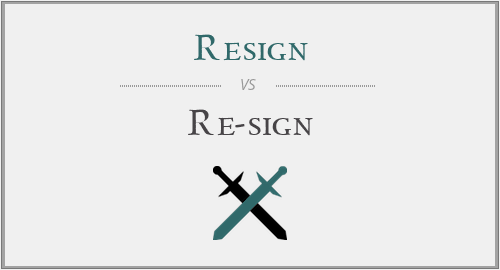Do you intend to re-sign the employment contract?
Susan had resolved to resign from her position.
Notice the above two sentences. Did you understand the meanings of resign and re-sign from them? If not, this article will explain the meanings and difference between the two words.
Origin:
Resign originated from late Middle English: from Old French resigner, from Latin resignare ‘unseal, cancel’, from re- ‘back’ + signare ‘sign, seal’.
Resign as verb:
Resign is used as a verb in English language where it means voluntarily leave a job or office.
He resigned from the government in protest at the policy.
Resign is also used to imply the action of giving up an office or privilege.
Four deputies resigned their seats.
Ending a game by conceding defeat without being checkmated is also called resign.
He lost his Queen and resigned in 45 moves.
Resign is also used to describe the action of accepting that something undesirable cannot be avoided.
She resigned herself to a lengthy session.

In the past, resign was used to surrender oneself to another's guidance.
He vows to resign himself to her direction.
Re-sign as verb:
Re-sign is also used as a verb in English language where it means to sign (a document) again.
He had to re-sign the cheque as the signature did not tally with that in the records of the bank.
To engage (a sports player) to play for a team for a further period is referred to as re-sign.
That win backed up my insistence that we re-sign him.
When a sports player commit oneself to play for a team for a further period, he/she re-signs for it.
They both played for the club last season and have agreed to re-sign.
Resign or re-sign:
Both words are exactly the same in spelling but completely different in meaning. Both are verbs: the past tense of resign is resigned; similarly that of re-sign is re-signed. “Resign” means to voluntarily give up (a job or position) in a formal or official way; or to make yourself accept something that is bad or that cannot be changed. If you resign from your job it was your decision to leave the job, but if you are sacked from your job, you did not consent to giving up your job. Sometimes you are forced to resign from your job to make a pretense that you did it voluntarily and were not sacked! Similarly if you are resigned to your fate, it means you have stopped fighting the forces which dealt you an unpleasant blow.




Have a discussion about this article with the community:
Report Comment
We're doing our best to make sure our content is useful, accurate and safe.
If by any chance you spot an inappropriate comment while navigating through our website please use this form to let us know, and we'll take care of it shortly.
Attachment
You need to be logged in to favorite.
Log In